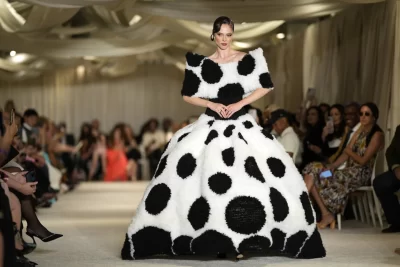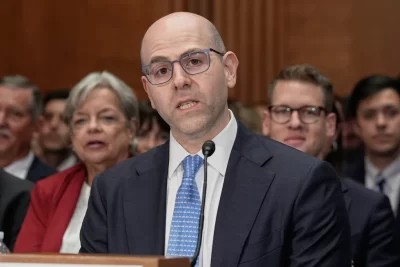Huddled together on a snakeskin couch in a New York hotel, their euphoria was infectious.
Måneskin just played a pop-up lunchtime show in Times Square, and now they learned their Madison Square Garden show scheduled for later in the week was a sellout.
Pleasantly surprised, frontman Damiano David called the news “very special.”
“It’s one of the most important places where you can ever dream to play,” David said.
That show Thursday night will kick off the North American leg of their Rush! World Tour that began earlier this year.
In an era where rock bands seem endangered and most of the top acts in the genre came from the last millennium, Måneskin has become something of an anomaly.
Coming to prominence in 2021 after an unexpected win at the Eurovision Song Contest with their high-energy rocker, “Zitti E Buoni,” the Italian quartet seems to be reviving rock music, or at least, providing a breath of hope.
Bass player Victoria De Angelis says it was never intentional.
Instead, she says the band was born out of “pure passion” between four friends who met in high school.
“I think for us this thing of making rock music just came because we were so young,” she said.
They simply wanted to make music, never having the notion of “breaking through” in the music business as a rock act.
“We grew up listening to the music our parents did. And then when we started playing our instruments to our teachers and just discovering rock music and all the bands of the past. It’s something that really shaped us in who we are today,” De Angelis said.
That osmosis ripples through the band as they listened to classic rock filtered from their parents and grandparents. Guitarist Thomas Raggi knew he wanted to play rock music after hearing what Jimi Hendrix could with a Stratocaster.
“I want to revive a bit of the figure of the iconic guitarist,” Raggi said.
Drummer Ethan Torchio shares that sentiment, saying that his style is different while informed by the rock of the ‘70s and ’80s. “I just try to be modern and vintage at the same time,” he said.
Now with three studio albums under their belt, the young rockers (David is the oldest at 24) are becoming a global phenom. As the band’s popularity continues to increase, De Angelis says she’s not affected by the fame, rather she sees it as “a big adventure that we get to share with each other.”
“I think we’re lucky because we met when we were really young, so our personalities basically developed together and we lived this crazy experience together that made the bond between us even tighter,” De Angelis said.
While they can easily be mistaken for glam rockers of another era with their fashion style and arena anthems like “I Wanna Be Your Slave,” or “Supermodel,” there’s a strong sensuality to the music that harkens back to that forbidden appeal from the early days of rock ‘n’ roll with the intimacy “upped to 11” during live shows. Subsequently, the band has amassed a dedicated global following, led by their charismatic frontman.
David attributes that vibe from the band’s days of busking on the streets of Rome as teenagers.
“We had to get the attention of the people. So, we saw that interacting and getting close is something that really works,” David said.
That carried over to their live show, as they break away from the main stage for a few songs to get closer to the audience. They also have brought fans onstage.
“We try to come up with ways to get closer to the people because you can actually feel the energy. Also, you can touch and see their faces and make them sing… it’s just sharing a fun moment for us,” David said.
The relationship between artist and audience was intensified during their South America dates where the band was exposed to some of the most energetic audiences.
“People go crazy, they sing the lyrics all the time. They really scream at the top of their lungs. They mosh. They crowd surf. It’s like maximum energy,” De Angelis said.
But as their fan base continues to grow, along with the size of the venues, David admits success presents some challenges.
“It brings more fans, of course, and stuff like that, but it brings more haters, more criticism and more expectations.”
But he says the band remains resilient.
“Very often, the audience wants artists to be always the same. But I think it’s very, very unhealthy. So it’s important having the guts to continuously experiment and change no matter what people are going to think,” David said.
About Author






